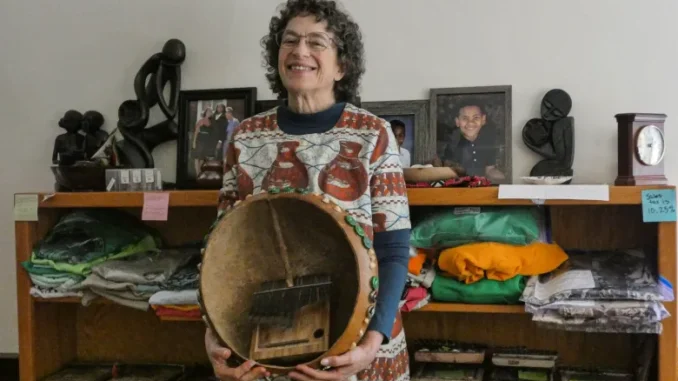Erica Azim has spent decades studying and performing with revered Shona artists Her Berkeley nonprofit has recorded thousands of songs and sent more than $1.6 million to Zimbabwean musicians and instrument makers Erica Azim holds a mbira in a deze, a hollowed-out gourd, in her Central Berkeley home on Friday, Aug 8 Her Berkeley nonprofit has sold thousands of mbiras built in Zimbabwe by Shona artisans Credit: Daniel Ekonde/Berkeleyside “Can you explain how you fall in love?” asks Erica Azim “In a certain way it’s an impossible question.” Yet it’s a conundrum the Berkeley native has contemplated for half a century, every time she’s asked about her abiding passion for mbira, which is both the traditional music of the Shona people of Zimbabwe and the thumb piano-like instrument that’s the primary medium for their celebrations and ceremonies Mbira masterVitalis “Samaita” Botsa willplay duetswith Erica Azim at the Freight at 7 p.m on Sunday, Aug 17 Azim’s commitment to supporting musicians, healers and instrument-makers in the southern African nation has turned Berkeley into an unlikely center of cultural preservation Over the past four decades Azim has built the nonprofit she founded and runs,MBIRA, into one of the world’s foremost archives of the incantatory Shona art form, spreading awareness through recordings, in-person workshops, performances,online lessons, and the sale of thousands of mbiras built in Zimbabwe by Shona artisans A recently deployed streaming service provides access to more than 450 hours of mbira performed by a wide spectrum of masters from around Zimbabwe The vast catalog includes recordings and videos, mostly made by Azim herself on trips through rural Zimbabwe, providing a welcoming portal for anyone intrigued by mbira, which is often used in summoning ancestral spirits to healing rituals All sales proceeds are funneled back to artists, providing a lifeline in a region beset by persistent drought and corruption-driven economic decline “As of a year ago, we’ve sold thousands of mbiras and sent more than $1.6 million to more than 300 instrument makers and musicians,” Azim said Azim has studied and performed with top Shona practitioners Azim records Musekiwa Mujuru, Cletos Manjengwa and Fungai Mujuru as they perform in Mujuru village in 1996 Credit: Tracy Willett Because traditional songs, scales and mbira tunings often vary village to village, there’s tremendous variation in mbira Azim has studied and performed with many of the art form’s most revered practitioners, including Ambuya Beauler Dyoko, Fradreck and Fungai Mujuru, Irene Chigamba, Vakaranga Venharetare, Patience Chaitezvi, Renold and Caution Shonhai, and Leonard Chiyanike, most of whom she’s also presented in concerts in the U.S and Europe Her own approach is both deeply traditional and broadly cosmopolitan, encompassing many of the different mbira influences she’s absorbed “She’s as knowledgeable as anybody in the U.S, a true scholar, and I think her passion is to preserve the culture and help the people who can extend the culture and teach it to their people,” said Berkeley composer Todd Boekelheide, who produced Azim’s 1992 albumMbira Dreamsand has long served on MBIRA’s board of director Boekelheide explained his abiding love of mbira as flowing from “its inherent power.” “The music is spiritual,” he said, “and draws you in with apparent simplicity It’s played with only three digits on two hands, but sounds like a symphony, like 10 people are playing because of how the notes interact Over the eons folk music sheds anything that isn’t an authentic expression of something that’s deeply, powerfully true.” A pair of mbiras Credit: Daniel Ekonde/Berkeleyside Source: The Zimbabwe Mail All Zim News is a central hub for all things Zimbabwean, curating news from across the country so no story is missed Alongside aggregation, our team of nationwide reporters provides real-time, on-the-ground coverage Stay informed and connected — reach us at admin@allzimnews.com. Source: Thezimbabwemail
 Image from Erica Azim has spent decades studying and performing with revered Shona artists
Image from Erica Azim has spent decades studying and performing with revered Shona artists